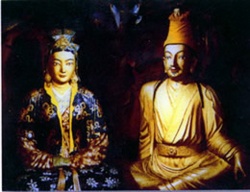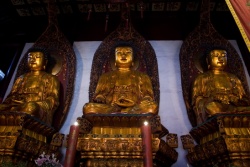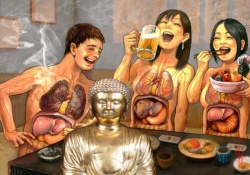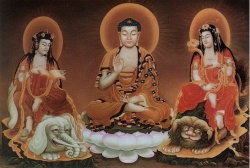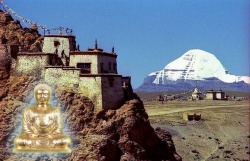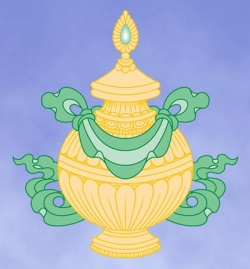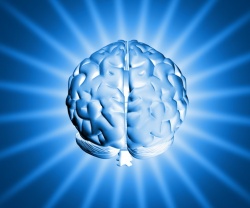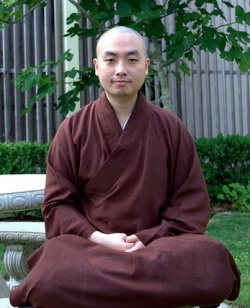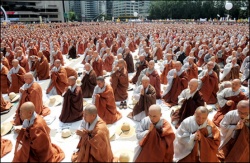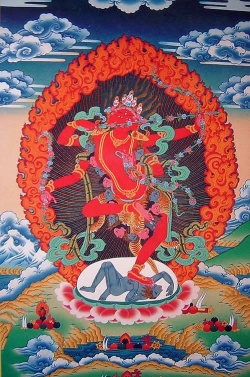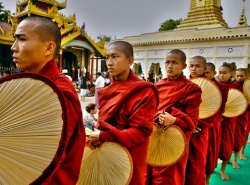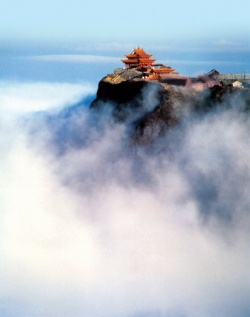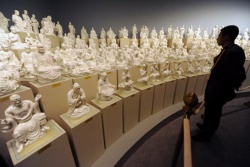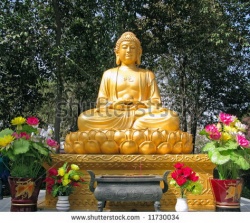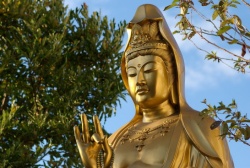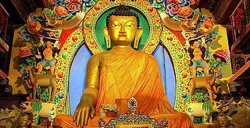Difference between revisions of "Ch'an Buddhism"
| (22 intermediate revisions by 4 users not shown) | |||
| Line 1: | Line 1: | ||
| − | [[File:193453s.jpg|thumb|250px|]] | + | [[File:193453s.jpg|thumb|250px|]]<nomobile>{{DisplayImages|1469|1482|1329|3589|185|3736|1669|945|3674|3540|1875|2338|2299|1419|2270}}</nomobile> |
| − | |||
| − | |||
| − | |||
| − | |||
| − | |||
| − | |||
| − | |||
| − | + | === 1. The Introduction of [[Buddhism]] into [[China]] === | |
| − | : | + | The [[Wikipedia:Qin dynasty|Ch'in dynasty]] gave way to the {{Wiki|Han dynasty}}, which lasted from 202 BCE to 220 CE; it was a period of {{Wiki|prosperity}} and stability in {{Wiki|Chinese}} {{Wiki|history}}. |
| − | : | + | During this [[time]] the [[Great]] Wall of [[China]] was extended (it was built in the [[Wikipedia:Qin dynasty|Ch'in dynasty]] to keep the less-civilized, {{Wiki|nomadic}} tribes of {{Wiki|central}} {{Wiki|Asia}} out of [[China]]). Intellectually this period was conservative, unlike the period of the hundred [[philosophers]]. |
| − | + | During this [[time]] {{Wiki|Confucianism}} dominated the {{Wiki|social}} and [[religious]] [[life]] of the [[people]]; it provided a basis for {{Wiki|social}} {{Wiki|structure}} that encouraged stability and {{Wiki|unity}}. | |
| − | + | Taosim still survived in this period in both its [[philosophical]] [[form]] and in what we could call its populist [[religious]] [[form]]. | |
| − | + | This is the [[intellectual]] context into which [[Buddhism]] began to enter around the [[time]] of {{Wiki|Christ}} (when [[Buddhism]] was well established in {{Wiki|northern India}} and was spreading into southern [[India]] and [[Sri Lanka]]) | |
| − | :Nevertheless, in spite of these obstacles, Buddhism did take hold slowly in Chinese culture; the penetration of Buddhism into Chinese society was aided by its assimilation of some Taoist and Confucian terminology as a means of mediating central Buddhist ideas. By the fourth century it was firmly established in China in various forms. | + | [[Buddhism]] made its way into [[China]] via the trade routes connecting [[China]] to [[India]] (the so-called "{{Wiki|Silk Road}}"). |
| + | |||
| + | Since the {{Wiki|Chinese}} had a long established {{Wiki|culture}} with its [[own]] indigenous [[philosophies]] and [[religions]], at first [[Buddhism]] was not well received; it only gained a foothold in {{Wiki|Chinese}} {{Wiki|culture}} very slowly. | ||
| + | |||
| + | The [[reason]] for the initial resistance to [[Buddhism]] was due to the fact that in {{Wiki|general}} [[Buddhism]] ran counter to some important presuppositions of {{Wiki|Chinese}} {{Wiki|culture}}: | ||
| + | |||
| + | 1. [[Buddhism]] tended to be much more {{Wiki|pessimistic}} and other-worldly than the {{Wiki|Chinese}} were generally; the {{Wiki|Chinese}} tended to be much more this-worldly and positive in their assessment of {{Wiki|individual}} [[bodily]] [[existence]]. | ||
| + | |||
| + | 2. The [[Buddhist]] requirement of withdrawal from domestic [[life]] and [[formation]] of [[monastic]] communities ran counter to {{Wiki|Chinese}} {{Wiki|social}} norms. | ||
| + | |||
| + | Not to marry and produce children was seen as ignoring one's [[duty]] to the {{Wiki|ancestors}}, since the living have a [[perennial]] {{Wiki|obligation}} to maintain the well-being of those who had [[died]] through making [[food]] [[offerings]]. | ||
| + | |||
| + | 3. The {{Wiki|Chinese}}, like most other peoples, believed that [[human beings]] had a [[soul]] that survived [[death]]; the [[Buddhist doctrine]] of [[anatman]] ([[no-self]]) was therefore puzzling and [[offensive]] to them. | ||
| + | |||
| + | Nevertheless, in [[spite]] of these {{Wiki|obstacles}}, [[Buddhism]] did take hold slowly in {{Wiki|Chinese}} {{Wiki|culture}}; | ||
| + | |||
| + | the [[penetration]] of [[Buddhism]] into {{Wiki|Chinese}} {{Wiki|society}} was aided by its assimilation of some {{Wiki|Taoist}} and {{Wiki|Confucian}} {{Wiki|terminology}} as a means of mediating {{Wiki|central}} [[Buddhist]] [[ideas]]. By [[the fourth]] century it was firmly established in [[China]] in various [[forms]]. | ||
| − | |||
[[File:1G22B092-2.jpg|thumb|250px|]] | [[File:1G22B092-2.jpg|thumb|250px|]] | ||
| − | + | It was the [[Mahayana]] [[forms]] of [[Buddhism]] for the most part that were imported into [[China]]. | |
| + | |||
| + | It usually happened that a text of [[Mahayana Buddhism]] would be translated and studied by a native {{Wiki|Chinese}} who would then lecture on the text and soon would develop the [[Wikipedia:concept|concepts]] therein, adapting them to {{Wiki|Chinese}} [[thought]] and expression; this usually resulted in the [[formation]] of a school. | ||
| + | |||
| + | |||
| + | === 2. The [[Ch'an Form of Buddhism]] === | ||
| + | |||
| + | |||
| + | ==== 2.1. Origins ==== | ||
| + | |||
| + | |||
| + | The most popular (at least among the intelligentia and [[Buddhist]] [[monks]]) [[form]] of [[Chinese Buddhism]] was [[Ch'an]] ([[Zen]]) [[Buddhism]], so called [[because of]] it [[stress]] on [[meditation]] ([[Ch'an]] is the {{Wiki|Chinese}} transliteration of the [[Sanskrit]] [[word]] [[Dhyana]], which means [[meditation]], one of the [[elements]] of The [[Eightfold Path]]: [[right concentration]]). | ||
| + | |||
| + | [[Ch'an Buddhism]] traces its origins in [[China]] to [[Bodhidharma]], an [[Indian]] [[Buddhist]] {{Wiki|missionary}} who came to [[China]] from [[India]] c. 520 CE. | ||
| + | |||
| + | There are five other "[[patriarchs]]" associated with early [[Ch'an Buddhism]]. | ||
| + | |||
| + | [[Bodhidharma]] passed his mantle to [[Hui-k'o]], and this line of [[transmission]] continued to the [[fifth patriarch]], [[Heng-jen]]. | ||
| + | |||
| + | After his [[death]], however, there was {{Wiki|schism}} between the northern and the southern [[forms]] of [[Ch'an Buddhism]]. | ||
| + | |||
| + | (According to [[Ch'an Buddhism]], [[Bodhidharma]] is the [[28th patriarch]] of the [[Indian meditational school]], which began with the [[Monk]] [[Kasyapa]], to whom The [[Buddha]] revealed his [[supreme]] [[teaching]].) | ||
| + | |||
| + | The contested issue between the two groups was over the [[nature]] of [[Enlightenment]]. | ||
| + | |||
| + | The [[monks]] of the [[Northern School]] under the [[leadership]] of [[Shen-hsui]] held that [[Enlightenment]] was a [[gradual process]], whereas the [[Southern School]] led by [[Hui-neng]] believed that, since true [[Wisdom]] was undifferentiated, [[Enlightenment]] could only be [[attained]] suddenly and all at once. | ||
| + | |||
| + | In this struggle for supremacy the [[Southern School]] eventually prevails and so [[Hui Neng]] is now considered to be the [[sixth patriarch]] and the {{Wiki|de facto}} [[second founder of Ch'an Buddhism]]. | ||
| + | |||
| + | His work, called the [[Platform Sutra]], is the major {{Wiki|literary}} expression of [[Ch'an]] [[Buddhism]]. | ||
| + | |||
| + | |||
| + | |||
| + | === [[Philosophical Distinctives of Ch'an Buddhism]] === | ||
| + | |||
| + | |||
| + | |||
| + | ===In [[Ch'an Buddhism]]=== | ||
| + | |||
| − | |||
| − | + | [[Wisdom]] ([[Prajna]]), which leads to (or is) [[Enlightenment]], is transmitted apart from propositional [[teaching]]. | |
| − | + | Since [[emptiness]], the {{Wiki|central}} [[idea]] of [[Mahayana Buddhism]], by [[definition]] is {{Wiki|ineffable}}, there can be no [[teaching]] about [[emptiness]]. | |
| − | : | + | Thus arises the [[idea]] in [[Ch'an Buddhism]] that [[Wisdom]] is transmitted non-verbally from [[master]] to [[student]]: |
| − | + | it is a [[transmission from mind to mind]] without the [[mediation]] of words, a direct personal [[transmission]] from one already [[enlightened]] to one in need of [[Enlightenment]]. | |
| − | + | This means that authority rests not in {{Wiki|canonical}} texts but in a [[lineage]] of [[masters]]. | |
| − | + | In the [[Platform Sutra]] the [[lineage]] is traced from the [[sixth patriarch]] back to The [[Buddha]] himself. | |
| − | |||
| − | |||
| − | + | ===The [[sudden Enlightenment school of Ch'an Buddhism]]''' ([[Southern School]])=== | |
| − | |||
| − | |||
| − | + | the school that becomes dominant and the one represented by the [[Platform Sutra]], embraces an intuitive method of [[spiritual]] {{Wiki|training}} aimed at the discovery of a [[reality]] in the innermost recesses of one's {{Wiki|being}}. | |
| − | + | This [[reality]] is the fundamental {{Wiki|unity}} which pervades all differences and particulars of the [[world]]; thus it is [[emptiness]] ([[Sunyata]]), devoid of all {{Wiki|distinctions}} and thereby inexpressible, even to say that it is inexpressible. | |
| + | |||
| + | [[Ch'an]] [[Buddhism]] identifies this as [[Nirvana]], the [[Buddha-nature]] or [[Buddha]], the [[Essence of Mind]] and [[suchness]] ([[Tathata]]) and even the {{Wiki|Tao}}. | ||
| + | |||
| + | It is from this original [[emptiness]] that all things emerge and become what they are; thus no thing is {{Wiki|real}} in itself, {{Wiki|ontologically}} {{Wiki|independent}} and necessary. | ||
[[File:193453.jpg|thumb|250px|]] | [[File:193453.jpg|thumb|250px|]] | ||
| − | |||
| − | + | The [[person]] who comes to [[Enlightenment]] [[understands]] all things as a [[manifestation]] of this {{Wiki|unity}}, so that the things [[experienced]] are understood as neither [[existing]] in the [[ultimate]] [[sense]] nor as not [[existing]] (This is another application of the [[Middle Way]]). | |
| + | |||
| + | The [[realization]] of the [[emptiness]] of all things leads to a [[non-attachment]] to all things. | ||
| + | |||
| + | It must be stressed, however, that the goal is not to withdraw from the plurality of things by emptying the [[mind]] of its [[objects]]; this is not true [[Enlightenment]]. | ||
| + | |||
| + | Rather one continues to [[experience]] the plurality of "things," but with the [[realization]] of their [[emptiness]], their [[ultimate]] lack of [[reality]]. | ||
| + | |||
| + | In other words, one denies the [[self-existence]] of all things, i.e., by "[[affirming]]" [[Sunyata]], since no {{Wiki|distinction}} is ultimately {{Wiki|real}}. | ||
| + | |||
| + | This leads one to associate with "things" in such a way as to have no [[attachment]] to them. | ||
| + | |||
| + | There is a tendency in [[Ch'an Buddhism]] to de-objectify all referents of [[Buddhist Philosophy]]: whatever is said to be true externally and objectively is actually true internally and subjectively. | ||
| + | |||
| + | |||
| + | In [[Ch'an Buddhism]] the [[Absolute]] is identified with the {{Wiki|individual}} [[mind]]''' or, more exactly, what the unenlightened wrongly take to be the {{Wiki|individual}} [[mind]]. | ||
| + | |||
| + | The [[sentient being]] who is [[enlightened]] [[understands]] his [[mind]] or [[consciousness]] as [[identical]] with the [[Absolute]], without [[duality]], especially between [[subject]] and [[object]]. | ||
| + | |||
| + | All things are one and the one is all things. | ||
| + | |||
| + | As already noted, this means that the [[Absolute]] is impervious to discursive [[thought]] and cannot be expressed propositionally (so that any {{Wiki|discourse}} about it is really futile). | ||
| + | |||
| + | Thus the [[enlightened]] [[person]] [[recognizes]] the [[unreality]] or [[relative]] [[reality]] of the [[phenomenal]] [[world]], the [[world]] constituted by a [[subject]] {{Wiki|being}} {{Wiki|aware}} of [[objects]] that are not the [[self]]. | ||
| + | |||
| + | {{Wiki|Being}} so {{Wiki|aware}} of the [[illusion]] of plurality, such a [[person]] becomes unattached to it. | ||
| + | |||
| + | One could call [[Ch'an Buddhism]] is a [[form]] of [[absolute]] {{Wiki|idealism}}, because, in continuity with certain schools of [[Mahayana Buddhism]], such as the [[Yogacara]] (as exemplified in The [[Lankavatara Sutra]]), it affirms that the [[Essence of Mind]] is the origin of all [[phenomena]], i.e., | ||
| − | + | the [[phenomenal]] [[world]]; there is no {{Wiki|independent}} [[existence]] of non-[[Sentient beings]], whereas all [[Sentient beings]] are really one, an original [[mind]] prior to the [[manifestation]] of [[duality]], even that of [[subject]] and [[object]]. | |
| − | |||
| − | |||
| − | + | ===In the [[sudden enlightement school]] of [[Ch'an Buddhism]]=== | |
| − | |||
| − | |||
| − | + | [[meditation]] serves the [[purpose]] of [[calming]] the ({{Wiki|individual}}) [[mind]] and eliminating all [[conscious]] (i.e., [[dualistic]]) [[thought]], | |
| − | + | in [[order]] that the one [[meditating]] may understand [[reality]] as it truly is, i.e., [[non-dualistic]] and undifferentiated, and thereby become [[enlightened]]. | |
| − | + | [[Enlightenment]] is sudden because the [[Absolute]] is one and therefore indivisible, so that it makes no [[sense]] to speak of gradually becoming [[enlightened]], as if one can have a part of [[Enlightenment]]. | |
| − | : | + | One can prepare for [[sudden Enlightenment]] by reading the [[sutras]] and practicing [[meditation]] ([[Dhyana]]), but, when it comes, [[Enlightenment]] comes all at once, suddenly. |
| + | |||
| + | In fact, study and [[meditation]] are not even necessary preconditions for [[attaining Enlightenment]]. | ||
| + | |||
| + | Since the [[attainment of Enlightenment]] is intuitive and not through discursive [[thought]], a [[master]] may attempt to wean his [[disciple]] from discursive {{Wiki|reasoning}} by a type of "[[shock]] therapy." | ||
| + | |||
| + | This is the role of the "riddle" ([[kung-an]]) in [[Ch'an Buddhism]]: a [[master]] will pose a question for which there is no [[rational]] answer (e.g., | ||
| + | |||
| + | "What is the [[sound]] of one hand clapping?; | ||
| + | |||
| + | "How do you get a {{Wiki|goose}} out of a bottle without breaking the bottle or {{Wiki|killing}} the {{Wiki|goose}}?") in [[order]] to move the [[disciple]] away from the [[dualism]] of discursive [[thinking]]. | ||
| + | |||
| + | |||
| + | See Examples of the [[Kung-an]]. | ||
| + | |||
| + | |||
| + | |||
| + | === Selections from [[Platform Sutra]] === | ||
| − | |||
| − | |||
[[File:1730034.jpg|thumb|250px|]] | [[File:1730034.jpg|thumb|250px|]] | ||
| − | :Our body is the [[Bodhi]]-tree, | + | :Our [[body]] is the [[Bodhi]]-[[tree]], |
| + | :And our [[mind]] a [[mirror]] bright. | ||
| + | :Carefully we wipe them hour by hour, | ||
| + | :And let no dust alight. | ||
| + | |||
| + | |||
| + | :There is no [[Bodhi]]-[[tree]], | ||
| + | :Nor stand of a [[mirror]] bright. | ||
| + | :Since all is [[Void]], | ||
| + | :Where can the dust alight? | ||
| + | |||
| + | The [[fifth patriach]], [[Hui neng]], invited each [[Monk]] under his [[direction]] to formulate a [[stanza]] ([[gatha]]) that expresses the [[essence]] of [[Dharma]]. | ||
| + | |||
| + | The first [[stanza]] quoted above is that formulated by [[Shen hsiu]]. | ||
| + | |||
| + | The [[meaning]] of the statement that the [[body]] with the [[Bodhi-tree]] is that the [[human]] [[body]] provides [[shelter]] for the [[mind]], just as the [[Bodhi-tree]] provided The [[Buddha]] with [[shelter]] as he sought [[Enlightenment]]. | ||
| + | |||
| + | According to [[Shen hsiu]], the [[essence]] of ([[Ch'an Buddhism]] is to remove from the [[mind]] all content that would obscure the [[nature]] of [[reality]]. | ||
| + | |||
| + | To this end, the {{Wiki|Taoist}} {{Wiki|image}} of cleaning the dust off a [[mirror]] is used: just as only when a [[mirror]] is clean can it reflect [[reality]], the [[mind]] can reflect [[reality]] only when it is [[pure]] of [[defilements]], i.e., [[ignorance]]. | ||
| + | |||
| + | The [[religious]] goal is to see the original [[purity]] of the [[mind]] and then retain that [[vision]] by removing all [[defilements]]. | ||
| + | |||
| + | The [[fifth patriarch]], however, found the [[stanza]] of [[Shen hsiu]] it to be deficient, and therefore an indication that he had not yet [[attained]] [[Enlightenment]]. | ||
| + | |||
| + | The second [[stanza]] is that of [[Hui neng]]; it is designed as a modification and refutation of that of [[Shen hsiu]]. | ||
| − | + | He rejects the {{Wiki|central}} premise of [[Shen hsiu's]] [[stanza]] that there is an {{Wiki|individual}} (a [[body]] with a [[mind]]) to be concerned about keeping the [[mind]] clean of [[defilement]]; in fact the most significant [[defilement]] is the mistaken notion that there is a [[mind]] to keep undefiled. | |
| − | + | {{Wiki|Being}} [[attached]] to the [[idea]] of a [[mind]] to be kept [[pure]] will prevent [[Enlightenment]]. | |
| − | : | + | Since all things are [[empty]] of {{Wiki|ontological}} {{Wiki|independence}}, then ultimately there can be no {{Wiki|individual}} [[mind]]: "Since all is [[Void]], where can the dust alight?" The [[realization]] of this is [[Enlightenment]]. |
| − | + | "To attain [[supreme Enlightenment]], one must be able to know spontaneously one's [[own]] [[nature]] or [[Essence of Mind]], which is neither created nor can it be {{Wiki|annihilated}}. | |
| − | + | From [[ksana]] to [[ksana]] ([[thought-moment]] to [[thought-moment]]), one should be able to realize the [[Essence of Mind]] all the [[time]]. | |
| − | + | All things will then be free from {{Wiki|restraint}} (i.e., emancipated). | |
| − | + | Once the [[Tathata]] ([[Suchness]], another [[name]] for the [[Essence of Mind]]) is known, one will be free from [[delusion]] forever; and in all circumstances one's [[mind]] will be in a [[state]] of '[[Thusness]]'. | |
| − | + | Such a [[state of mind]] is [[absolute]] [[Truth]]. | |
| − | + | If you can see things in such a frame of [[mind]] you will have known the [[Essence of Mind]], which is [[supreme]] [[Enlightenment]]. | |
| − | + | In a private [[conversation]] with [[Shen hsiu]], the [[fifth patriarch]] explains to him that, until he [[understands]] his [[own]] [[nature]] as the [[Essence of Mind]], [[Shen hsiu]] will continue to be unenlightened. | |
| − | + | He means that what [[Shen hsiu]] does not understand is that his [[mind]] or [[consciousness]] is [[identical]] with the [[Absolute]] ([[Essence of Mind]] or [[Tathata]]), which is neither created nor can it be destroyed. | |
| − | + | To understand all things as a [[manifestation]] of [[Essence of Mind]] continually, from [[moment]] to [[moment]] is to be in a [[state of Enlightenment]]; this is called having one's [[mind]] in a [[state]] of "[[thusness]]." | |
| − | + | [[Knowing]] what his message meant, in the third watch of the night I went to his room. | |
| − | + | Using the robe as a screen so that none could see us, he expounded [[The Diamond Sutra]] to me. | |
| − | + | When he came to the sentence, "One should use one's [[mind]] in such a way that it will be free from any [[attachment]]," I at once became thoroughly [[enlightened]], and [[realized]] that all things in the [[universe]] are the [[Essence of Mind]] itself. | |
| − | + | "Who would have [[thought]]," I said to the [[Patriarch]], "that the [[Essence of Mind]] is intrinsically [[pure]]! | |
| − | + | Who would have [[thought]] that the [[Essence of Mind]] is intrinsically free from becoming or [[annihilation]]! | |
| − | + | Who would have [[thought]] that the [[Essence of Mind]] is intrinsically self-sufficient! Who would have [[thought]] that the [[Essence of Mind]] is intrinsically free from change! | |
| − | + | Who would have [[thought]] that all things are the [[manifestation]] of the [[Essence of Mind]]!" | |
[[File:1546-hd.jpg|thumb|250px|]] | [[File:1546-hd.jpg|thumb|250px|]] | ||
| − | + | In a [[conversation]] with the [[fifth patriarch]], [[Hui neng]] becomes [[fully enlightened]] insofar as he "[[realized]] that all things in the [[universe]] are the [[Essence of Mind]] itself." | |
| + | |||
| + | In other words, he came to understand that all things are a [[manifestation]] of the [[Absolute]], but without distinguishing between the [[Absolute]] and its [[manifestations]]. | ||
| + | |||
| + | As the [[Absolute]], [[Essence of Mind]] is changeless and self-sufficient (as opposed to {{Wiki|being}} [[conditioned]], i.e., {{Wiki|ontologically}} dependent). | ||
| + | |||
| + | This also means that the [[Essence of Mind]] has no [[defilements]], for what could defile it would be itself, but it is not defiling. | ||
| + | |||
| + | The [[concern]] to {{Wiki|purify}} the [[Essence of Mind]] from [[defilements]] ([[attachments]]) is abandoned because [[Essence of Mind]] is intrinsically [[pure]]; in this way the [[dualism]] between [[purity]] and [[impurity]] is nullified. | ||
| + | |||
| + | "Since the [[object]] of your coming is the [[Dharma]]," said I, "refrain from [[thinking]] of anything and keep your [[mind]] blank. | ||
| + | |||
| + | I will then teach you." When he had done this for a considerable [[time]], I said, "When you are [[thinking]] of neither good nor [[evil]], what is at that particular [[moment]], [[Venerable]] Sir, your {{Wiki|real}} [[nature]] (literally, original face)?" | ||
| + | |||
| + | In [[order]] to bring one of his pursuers to enlightenement, [[Hui neng]] instructs him to refrain from [[thinking]] of anything and to keep his [[mind]] blank. | ||
| + | |||
| + | When he had done this, [[Hui neng]] asks him what that [[mental state]] when his [[mind]] has no content, [[nothing]] good nor bad. | ||
| + | |||
| + | The answered expected is that his [[original nature]] is [[Essence of Mind]]. | ||
| + | |||
| + | To be [[conscious]] of [[nothing]] and not even to be [[conscious]] of {{Wiki|being}} [[conscious]] of [[nothing]] is to understand the [[Absolute]], the undifferentiated ground of the [[manifestation]] of all things. | ||
| + | |||
| + | The [[Absolute]] is actually the {{Wiki|individual}} [[mind]], since to posit the [[Absolute]] as {{Wiki|distinct}} from a [[mind]] would be [[dualistic]]. | ||
| + | |||
| + | Only the erroneous assumption that one is a {{Wiki|individual}} [[consciousness]] {{Wiki|aware}} of [[objects]] different from oneself will prevent one from [[seeing]] one's [[original nature]]. | ||
| + | |||
| + | Learned Audience, when you hear me talk about the [[Void]], do not at once fall into the [[idea]] of [[vacuity]], (because this involves the [[heresy]] of the [[doctrine]] of [[annihilation]]). It is of the utmost importance that we should not fall into this [[idea]], because when a man sits quietly and keeps his [[mind]] blank he will abide in a [[state]] of '[[Voidness]] of [[Indifference]]'. | ||
| + | |||
| + | Learned Audience, the illimitable [[Void]] of the [[universe]] is capable of [[holding]] myriads of things of various [[shape]] and [[form]], | ||
| + | |||
| + | such as the {{Wiki|sun}}, the {{Wiki|moon}}, {{Wiki|stars}}, [[mountains]], [[rivers]], men, [[dharmas]] pertaining to [[goodness]] or badness, [[deva]] planes, [[hells]], great oceans, and all the [[mountains]] of the [[Mahameru]]. | ||
| + | |||
| + | [[Space]] takes in all of these, and so does the [[voidness]] of our [[nature]]. | ||
| + | |||
| + | We say that the [[Essence of Mind]] is great because it embraces all things, since all things are within our [[nature]]. | ||
| + | |||
| + | When we see the [[goodness]] or the badness of other [[people]] we are not attracted by it, nor repelled by it, nor [[attached]] to it; so that our [[attitude]] of [[mind]] is as [[void]] as [[space]]. | ||
| + | |||
| + | In this way, we say our [[mind]] is great. Therefore we call it '[[Maha]]'. | ||
| + | |||
| + | In his {{Wiki|discourse}} to the [[Prefect Wie]], [[Hui neng]] teaches the [[void]] of which he speaks is not [[nothingness]], in the [[sense]] of [[non-being]], for to call the [[Void]] [[nothingness]] of [[non-being]] is to predicate something of the [[Void]], which makes the [[Void]] no longer [[void]]. | ||
| + | |||
| + | Like other [[Mahayanists]], [[Hui neng]] rejects the extreme of {{Wiki|annihilationism}} just as much as the other extreme, that things have [[self-nature]]. | ||
| − | + | When one keeps one's [[mind]] blank in [[meditation]], one is then is the [[state]] of "[[Voidness]] of [[Indifference]]," which means to be in a [[state]] of [[non-duality]], so that there are no any {{Wiki|distinctions}}, even between [[consciousness]] and its [[objects]]. | |
| − | + | He also teaches that the [[Void]] is capable of [[holding]] or producing all particular things, and this is what makes the [[Essence of Mind]], which is a {{Wiki|synonym}} for the [[Void]], great. | |
| − | + | The {{Wiki|individual}} [[mind]] is great when it is non-attached to its [[objects]]; | |
| − | + | the assumption is that the {{Wiki|individual}} [[mind]] is {{Wiki|aware}} of the [[emptiness]] or [[voidness]] of all things, so that [[attachment]] is not possible. | |
| − | + | Learned Audience, when we use [[Prajna]] for {{Wiki|introspection}} we are illumined within and without, and in a position to know our [[own]] [[mind]]. | |
| − | + | To know our [[mind]] is to obtain [[liberation]]. | |
| − | + | To obtain [[liberation]] is to attain [[Samadhi]] of [[Prajna]], which is 'thoughtlessness'. | |
| − | + | What is 'thoughtlessness'? | |
| − | + | 'Thoughtlessness' is to see and to know all [[Dharmas]] (things) with a [[mind]] free from [[attachment]]. | |
| − | + | When in use it pervades everywhere, and yet it sticks nowhere. | |
| − | + | What we have to do is to {{Wiki|purify}} our [[mind]] so that the six [[vijnanas]] (types of [[consciousness]]), in passing through the [[six gates]] ([[sense organs]]) will neither be [[defiled]] by nor [[attached]] to the six [[sense-objects]]. | |
| − | + | When our [[mind]] works freely without any [[hindrance]], and is at liberty to 'come' or to 'go', we attain [[Samadhi]] of [[Prajna]], or [[liberation]]. | |
| + | |||
| + | Such a [[state]] is called the [[function]] of 'thoughtlessness'. | ||
| + | |||
| + | But to refrain from [[thinking]] of anything, so that all [[thoughts]] are suppressed, is to be [[Dharma]]-ridden, and this is an erroneous [[view]]. | ||
| − | |||
[[File:320 g.jpg|thumb|250px|]] | [[File:320 g.jpg|thumb|250px|]] | ||
| − | + | As part of his {{Wiki|discourse}} to the [[Prefect Wei]], [[Hui neng]] says that the use of [[Prajna]] ([[Wisdom]]) will reveal one's [[own]] [[mind]], the implication {{Wiki|being}} that one's [[mind]] is really the [[Absolute]]. | |
| + | |||
| + | To know that one's [[own]] [[mind]] is the [[Absolute]] is be {{Wiki|liberated}} from [[Samsara]], which is equated with the [[Samadhi]] of [[Prajna]], | ||
| + | |||
| + | the [[state]] of [[knowing]] one's [[identity]] with the [[Absolute]] that results from [[Prajna]] ([[Wisdom]]). | ||
| + | |||
| + | To be in a [[state]] of [[Samadhi]] is to [[exist]] in thoughtlessness or [[no-thought]]. | ||
| + | |||
| + | This describes one's [[non-attachment]] to all the [[objects]] of one's [[consciousness]]; it is an [[enlightened]] type of [[knowing]] in which one is {{Wiki|aware}} of "things," but not [[attached]] to them because one realizes their [[ultimate]] [[emptiness]]. | ||
| + | |||
| + | The goal is not to cease using the [[mind]], but to use it in such a way that the [[mind]] {{Wiki|remains}} undefiled by {{Wiki|being}} unattached to the [[sense objects]]. | ||
| + | |||
| + | To [[aim]] to suppress all [[thinking]] is erroneous presumably because it presupposes that the [[Absolute]] is [[empty]] in the [[sense]] of {{Wiki|being}} no thing, which is not the case, since it is all things at the same [[time]] as {{Wiki|being}} itself. | ||
| + | |||
| + | Learned Audience, it has been the [[tradition]] of our school to take 'Idea-lessness' as our [[object]], 'Non-objectivity' as our basis, and '[[Non-attachment]]' as our fundamental {{Wiki|principle}}. | ||
| + | |||
| + | 'Idea-lessness' means not to be carried away by any particular [[idea]] in the exercise of the [[mental]] [[faculty]]. | ||
| + | |||
| + | 'Non-objectivity' means not to be absorbed by [[objects]] when in [[contact]] with [[objects]]. '[[Non-attachment]]' is the [[characteristic]] of our [[Essence of Mind]]. | ||
| + | |||
| + | All things - good or bad, [[beautiful]] or ugly - should be treated as [[void]]. | ||
| + | |||
| + | Even in [[time]] of [[disputes]] and quarrels we should treat our intimates and our enemies alike and never think of retaliation. | ||
| + | |||
| + | In the exercise of our [[thinking]] [[faculty]], let the {{Wiki|past}} be [[dead]]. | ||
| + | |||
| + | If we allow our [[thoughts]], {{Wiki|past}}, {{Wiki|present}}, and {{Wiki|future}}, to link up in a series, we put ourselves under {{Wiki|restraint}}. | ||
| + | |||
| + | On the other hand, if we never let our [[mind]] attach to anything, we shall gain [[emancipation]]. | ||
| − | + | For this [[reason]], we take '[[Non-attachment]]' as our fundamental {{Wiki|principle}}. | |
| − | + | To free ourselves from [[absorption]] in {{Wiki|external}} [[objects]] is called 'Non-objectivity'. When we are in a position to do so, the [[nature]] of [[Dharma]] will be [[pure]]. | |
| − | + | For this [[reason]], we take 'Non-objectivity' as our basis. | |
| − | + | To keep our [[mind]] free from [[defilement]] under all circumstances is called 'Idea-lessness'. | |
| − | + | Our [[mind]] should stand aloof from circumstances, and on no account should we allow them to [[influence]] the [[function]] of our [[mind]]. | |
| − | + | But it is a great mistake to suppress our [[mind]] from all [[thinking]]; | |
| − | + | for even if we succeed in getting rid of all [[thoughts]], and [[die]] immediately thereafter, still we shall be {{Wiki|reincarnated}} elsewhere. | |
| − | + | Mark this, treaders of the [[Path]]. | |
| − | + | It is bad enough for a man to commit blunders from not [[knowing]] the [[meaning]] of the Law, but how much worse would it be to encourage others to follow suit? {{Wiki|Being}} deluded, he sees not and in addition he blasphemes the [[Buddhist Canon]]. | |
| − | + | Therefore we take 'Idea-lessness' as our [[object]]. | |
| − | + | The school represented by [[Hui neng]] is characterized by "Idea-lessness," "Non-Objectivity" and "[[Non-attachment]]." "Idea-lessness" is the [[object]] (in the [[sense]] of goal) and is not to be carried away by [[objects]] of one's [[consciousness]], | |
| − | + | in the [[sense]] of {{Wiki|being}} affected by them on the assumption of their [[ultimate reality]]: | |
| − | + | "To keep our [[mind]] free from [[defilement]] under all circumstances is called 'Idea-lessness'." | |
| − | + | "Non-objectivity" is the basis or [[reason]] why one does not become "carried away" by [[objects]] of [[consciousness]]: | |
| − | + | since these things of which one is [[conscious]] are not ultimately {{Wiki|real}}, not true [[objects]], but derive from the [[Absolute]], one has no grounds to be truly affected by them. | |
| − | + | As [[Hui neng]] puts it, "To free ourselves from [[absorption]] in {{Wiki|external}} [[objects]] is called 'Non-objectivity'." | |
| − | + | "[[Non-attachment]] is is said to be the [[characteristic]] of [[Essence of Mind]], which means that when one realizes that one's [[original nature]] is [[Essence of Mind]], one is not [[attached]] to that which derives from it, since [[Essence of Mind]] is non-dulaistic. | |
| − | + | Once again, [[Hui neng]] rejects the notion that one should [[aim]] to eliminate all [[thoughts]] in the mistaken notion that the [[Absolute]] is really [[nothing]] in the [[sense]] that it is the {{Wiki|negation}} of all [[phenomena]]. | |
| − | + | [[Bhikkhu]] [[Chih Ch'ang]], a native of [[Kuei Ch'i]] of [[Hsin Chou]], joined the [[Order]] in his childhood, and was very zealous in his efforts to realize the [[Essence of Mind]]. | |
| − | + | One day, he came to pay homage to the [[Patriarch]], and was asked by the [[latter]] whence and why he came. | |
| − | + | "I have recently been to the [[White Cliff Mountain]] in [[Hung Chou]]," replied he, "to interview the [[Master]] [[Ta T'ung]], who was good enough to teach me how to realize the [[Essence of Mind]] and thereby attain [[Buddhahood]]. | |
| − | + | But as I still have some [[doubts]], I have travelled far to pay you [[respect]]. | |
| − | + | Will you kindly clear them up for me, Sir." "What instruction did he give you?" asked the [[Patriarch]]. | |
| − | + | "After staying there for three months without {{Wiki|being}} given any instruction, and {{Wiki|being}} zealous for the [[Dharma]], I went alone to his chamber one night and asked him what was my [[Essence of Mind]]. | |
| − | + | 'Do you see the illimitable [[void]]?' he asked. 'Yes, I do,' I replied. | |
| − | + | Then he asked me whether the [[void]] had any particular [[form]], and when I said that the [[void]] is [[formless]] and therefore cannot have any particular [[form]], he said, 'Your [[Essence of Mind]] is like the [[void]]. | |
| − | + | To realize that [[nothing]] can be seen is right [[seeing]]. | |
| − | + | To realize that [[nothing]] is knowable is true [[knowledge]]. | |
| − | + | To realize that it is neither [[green]] nor [[yellow]], neither long nor short, that it is [[pure]] by [[nature]], that its quintessence is {{Wiki|perfect}} and clear, is to realize the [[Essence of Mind]] and thereby attain [[Buddhahood]], which is also called The [[Buddha]]-[[knowledge]].' | |
| − | :A certain Chih Ch'ang requests of Hui neng that he explain to him his teaching of Essence of Mind. According to Hui neng, Chih Ch'ang's former teacher wrongly taught that the "view" that Essence of Mind can be understood as negation of all phenomena: "nothing is knowable is true knowledge." He explains that it is wrong to retain the idea of invisibility and unknowability as predicates of Essence of Mind: "To let these arbitrary concepts rise spontaneously in your mind indicates that you have mis-identified the Essence of Mind, and that you have not yet found the skilful means to realize it." It is still to understand Essence of Mind by reference to phenomena, in this case the negation of phenomena. Essence of Mind is neither visible nor invisisible, knowable nor non-knowable. In this way Essence of Mind is not opposed to the phenomenal world as its opposite, which means that the phenomenal world is not distingusihed from Essence of Mind. A corollary to this is the elimination of the distinction between [[Enlightenment]] and delusion, so that the one who says with pride "I am enlightened" is not truly enlightened. | + | As I do not quite understand his [[teaching]], will you please [[enlighten]] me, Sir." |
| + | |||
| + | "His [[teaching]] indicates," said the [[Patriarch]], "that he still retains the arbitrary [[Wikipedia:concept|concepts]] of [[views]] and [[knowledge]], and this explains why he fails to make it clear to you. Listen to my [[stanza]]: | ||
| + | |||
| + | |||
| + | :To realize that [[nothing]] can be seen but to retain the {{Wiki|concept}} of 'invisibility' | ||
| + | :Is like the surface of the {{Wiki|sun}} obscured by passing clouds. | ||
| + | :To realize that [[nothing]] is knowable but to retain the {{Wiki|concept}} of 'unknowability' | ||
| + | :May be likened to a clear sky disfigured by a {{Wiki|lightning}} flash. | ||
| + | :To let these arbitrary [[Wikipedia:concept|concepts]] rise spontaneously in your [[mind]] | ||
| + | :Indicates that you have mis-identified the [[Essence of Mind]], and that you have not yet found the [[skilful means]] to realize it. | ||
| + | :If you realize for one [[moment]] that these arbitrary [[Wikipedia:concept|concepts]] are wrong, | ||
| + | :Your [[own]] [[spiritual light]] will shine forth permanently. | ||
| + | |||
| + | |||
| + | Having [[heard]] this [[Chih Ch'ang]] at once felt that his [[mind]] was [[enlightened]]. Thereupon, he submitted the following [[stanza]] to the [[Patriarch]]: | ||
| + | |||
| + | |||
| + | :To allow the [[Wikipedia:concept|concepts]] of invisibility and unknowability to rise in the [[mind]] | ||
| + | :Is to seek [[Bodhi]] without freeing oneself from the [[Wikipedia:concept|concepts]] of [[phenomena]]. | ||
| + | :He who is puffed up by the slightest [[impression]], 'I am now [[enlightened]],' | ||
| + | :Is no better than he was when under [[delusion]]. | ||
| + | :Had I not put myself at the feet of the [[Patriarch]] | ||
| + | :I should have been bewildered without [[knowing]] the right way to go. | ||
| + | |||
| + | A certain [[Chih Ch'ang]] requests of [[Hui neng]] that he explain to him his [[teaching]] of [[Essence of Mind]]. | ||
| + | |||
| + | According to [[Hui neng]], [[Chih Ch'ang's]] former [[teacher]] wrongly [[taught]] that the "[[view]]" that [[Essence of Mind]] can be understood as {{Wiki|negation}} of all [[phenomena]]: "[[nothing]] is knowable is true [[knowledge]]." | ||
| + | |||
| + | He explains that it is wrong to retain the [[idea]] of invisibility and unknowability as predicates of [[Essence of Mind]]: | ||
| + | |||
| + | "To let these arbitrary [[Wikipedia:concept|concepts]] rise spontaneously in your [[mind]] indicates that you have mis-identified the [[Essence of Mind]], and that you have not yet found the [[skilful means]] to realize it." | ||
| + | |||
| + | It is still to understand [[Essence of Mind]] by reference to [[phenomena]], in this case the {{Wiki|negation}} of [[phenomena]]. [[Essence of Mind]] is neither [[visible]] nor invisisible, knowable nor non-knowable. | ||
| + | |||
| + | In this way [[Essence of Mind]] is not opposed to the [[phenomenal]] [[world]] as its {{Wiki|opposite}}, which means that the [[phenomenal]] [[world]] is not distingusihed from [[Essence of Mind]]. | ||
| + | |||
| + | A corollary to this is the elimination of the {{Wiki|distinction}} between [[Enlightenment]] and [[delusion]], so that the one who says with {{Wiki|pride}} "I am [[enlightened]]" is not truly [[enlightened]]. | ||
{{R}} | {{R}} | ||
| Line 225: | Line 442: | ||
[[Category:History of Buddhism]] | [[Category:History of Buddhism]] | ||
[[Category:Chan]] | [[Category:Chan]] | ||
| + | |||
| + | |||
| + | <metadesc>The [[Wikipedia:Qin dynasty|Ch'in dynasty]] gave way to the {{Wiki|Han dynasty}}, which lasted from 202 BCE to 220 CE; it was a period of {{Wiki|prosperity}} and stability in {{Wiki|Chinese}} {{Wiki|history}}.</metadesc> | ||
Latest revision as of 10:55, 26 December 2023
1. The Introduction of Buddhism into China
The Ch'in dynasty gave way to the Han dynasty, which lasted from 202 BCE to 220 CE; it was a period of prosperity and stability in Chinese history.
During this time the Great Wall of China was extended (it was built in the Ch'in dynasty to keep the less-civilized, nomadic tribes of central Asia out of China). Intellectually this period was conservative, unlike the period of the hundred philosophers.
During this time Confucianism dominated the social and religious life of the people; it provided a basis for social structure that encouraged stability and unity.
Taosim still survived in this period in both its philosophical form and in what we could call its populist religious form.
This is the intellectual context into which Buddhism began to enter around the time of Christ (when Buddhism was well established in northern India and was spreading into southern India and Sri Lanka)
Buddhism made its way into China via the trade routes connecting China to India (the so-called "Silk Road").
Since the Chinese had a long established culture with its own indigenous philosophies and religions, at first Buddhism was not well received; it only gained a foothold in Chinese culture very slowly.
The reason for the initial resistance to Buddhism was due to the fact that in general Buddhism ran counter to some important presuppositions of Chinese culture:
1. Buddhism tended to be much more pessimistic and other-worldly than the Chinese were generally; the Chinese tended to be much more this-worldly and positive in their assessment of individual bodily existence.
2. The Buddhist requirement of withdrawal from domestic life and formation of monastic communities ran counter to Chinese social norms.
Not to marry and produce children was seen as ignoring one's duty to the ancestors, since the living have a perennial obligation to maintain the well-being of those who had died through making food offerings.
3. The Chinese, like most other peoples, believed that human beings had a soul that survived death; the Buddhist doctrine of anatman (no-self) was therefore puzzling and offensive to them.
Nevertheless, in spite of these obstacles, Buddhism did take hold slowly in Chinese culture;
the penetration of Buddhism into Chinese society was aided by its assimilation of some Taoist and Confucian terminology as a means of mediating central Buddhist ideas. By the fourth century it was firmly established in China in various forms.
It was the Mahayana forms of Buddhism for the most part that were imported into China.
It usually happened that a text of Mahayana Buddhism would be translated and studied by a native Chinese who would then lecture on the text and soon would develop the concepts therein, adapting them to Chinese thought and expression; this usually resulted in the formation of a school.
2. The Ch'an Form of Buddhism
2.1. Origins
The most popular (at least among the intelligentia and Buddhist monks) form of Chinese Buddhism was Ch'an (Zen) Buddhism, so called because of it stress on meditation (Ch'an is the Chinese transliteration of the Sanskrit word Dhyana, which means meditation, one of the elements of The Eightfold Path: right concentration).
Ch'an Buddhism traces its origins in China to Bodhidharma, an Indian Buddhist missionary who came to China from India c. 520 CE.
There are five other "patriarchs" associated with early Ch'an Buddhism.
Bodhidharma passed his mantle to Hui-k'o, and this line of transmission continued to the fifth patriarch, Heng-jen.
After his death, however, there was schism between the northern and the southern forms of Ch'an Buddhism.
(According to Ch'an Buddhism, Bodhidharma is the 28th patriarch of the Indian meditational school, which began with the Monk Kasyapa, to whom The Buddha revealed his supreme teaching.)
The contested issue between the two groups was over the nature of Enlightenment.
The monks of the Northern School under the leadership of Shen-hsui held that Enlightenment was a gradual process, whereas the Southern School led by Hui-neng believed that, since true Wisdom was undifferentiated, Enlightenment could only be attained suddenly and all at once.
In this struggle for supremacy the Southern School eventually prevails and so Hui Neng is now considered to be the sixth patriarch and the de facto second founder of Ch'an Buddhism.
His work, called the Platform Sutra, is the major literary expression of Ch'an Buddhism.
Philosophical Distinctives of Ch'an Buddhism
In Ch'an Buddhism
Wisdom (Prajna), which leads to (or is) Enlightenment, is transmitted apart from propositional teaching.
Since emptiness, the central idea of Mahayana Buddhism, by definition is ineffable, there can be no teaching about emptiness.
Thus arises the idea in Ch'an Buddhism that Wisdom is transmitted non-verbally from master to student:
it is a transmission from mind to mind without the mediation of words, a direct personal transmission from one already enlightened to one in need of Enlightenment.
This means that authority rests not in canonical texts but in a lineage of masters.
In the Platform Sutra the lineage is traced from the sixth patriarch back to The Buddha himself.
The sudden Enlightenment school of Ch'an Buddhism (Southern School)
the school that becomes dominant and the one represented by the Platform Sutra, embraces an intuitive method of spiritual training aimed at the discovery of a reality in the innermost recesses of one's being.
This reality is the fundamental unity which pervades all differences and particulars of the world; thus it is emptiness (Sunyata), devoid of all distinctions and thereby inexpressible, even to say that it is inexpressible.
Ch'an Buddhism identifies this as Nirvana, the Buddha-nature or Buddha, the Essence of Mind and suchness (Tathata) and even the Tao.
It is from this original emptiness that all things emerge and become what they are; thus no thing is real in itself, ontologically independent and necessary.
The person who comes to Enlightenment understands all things as a manifestation of this unity, so that the things experienced are understood as neither existing in the ultimate sense nor as not existing (This is another application of the Middle Way).
The realization of the emptiness of all things leads to a non-attachment to all things.
It must be stressed, however, that the goal is not to withdraw from the plurality of things by emptying the mind of its objects; this is not true Enlightenment.
Rather one continues to experience the plurality of "things," but with the realization of their emptiness, their ultimate lack of reality.
In other words, one denies the self-existence of all things, i.e., by "affirming" Sunyata, since no distinction is ultimately real.
This leads one to associate with "things" in such a way as to have no attachment to them.
There is a tendency in Ch'an Buddhism to de-objectify all referents of Buddhist Philosophy: whatever is said to be true externally and objectively is actually true internally and subjectively.
In Ch'an Buddhism the Absolute is identified with the individual mind or, more exactly, what the unenlightened wrongly take to be the individual mind.
The sentient being who is enlightened understands his mind or consciousness as identical with the Absolute, without duality, especially between subject and object.
All things are one and the one is all things.
As already noted, this means that the Absolute is impervious to discursive thought and cannot be expressed propositionally (so that any discourse about it is really futile).
Thus the enlightened person recognizes the unreality or relative reality of the phenomenal world, the world constituted by a subject being aware of objects that are not the self.
Being so aware of the illusion of plurality, such a person becomes unattached to it.
One could call Ch'an Buddhism is a form of absolute idealism, because, in continuity with certain schools of Mahayana Buddhism, such as the Yogacara (as exemplified in The Lankavatara Sutra), it affirms that the Essence of Mind is the origin of all phenomena, i.e.,
the phenomenal world; there is no independent existence of non-Sentient beings, whereas all Sentient beings are really one, an original mind prior to the manifestation of duality, even that of subject and object.
In the sudden enlightement school of Ch'an Buddhism
meditation serves the purpose of calming the (individual) mind and eliminating all conscious (i.e., dualistic) thought,
in order that the one meditating may understand reality as it truly is, i.e., non-dualistic and undifferentiated, and thereby become enlightened.
Enlightenment is sudden because the Absolute is one and therefore indivisible, so that it makes no sense to speak of gradually becoming enlightened, as if one can have a part of Enlightenment.
One can prepare for sudden Enlightenment by reading the sutras and practicing meditation (Dhyana), but, when it comes, Enlightenment comes all at once, suddenly.
In fact, study and meditation are not even necessary preconditions for attaining Enlightenment.
Since the attainment of Enlightenment is intuitive and not through discursive thought, a master may attempt to wean his disciple from discursive reasoning by a type of "shock therapy."
This is the role of the "riddle" (kung-an) in Ch'an Buddhism: a master will pose a question for which there is no rational answer (e.g.,
"What is the sound of one hand clapping?;
"How do you get a goose out of a bottle without breaking the bottle or killing the goose?") in order to move the disciple away from the dualism of discursive thinking.
See Examples of the Kung-an.
Selections from Platform Sutra
- Our body is the Bodhi-tree,
- And our mind a mirror bright.
- Carefully we wipe them hour by hour,
- And let no dust alight.
The fifth patriach, Hui neng, invited each Monk under his direction to formulate a stanza (gatha) that expresses the essence of Dharma.
The first stanza quoted above is that formulated by Shen hsiu.
The meaning of the statement that the body with the Bodhi-tree is that the human body provides shelter for the mind, just as the Bodhi-tree provided The Buddha with shelter as he sought Enlightenment.
According to Shen hsiu, the essence of (Ch'an Buddhism is to remove from the mind all content that would obscure the nature of reality.
To this end, the Taoist image of cleaning the dust off a mirror is used: just as only when a mirror is clean can it reflect reality, the mind can reflect reality only when it is pure of defilements, i.e., ignorance.
The religious goal is to see the original purity of the mind and then retain that vision by removing all defilements.
The fifth patriarch, however, found the stanza of Shen hsiu it to be deficient, and therefore an indication that he had not yet attained Enlightenment.
The second stanza is that of Hui neng; it is designed as a modification and refutation of that of Shen hsiu.
He rejects the central premise of Shen hsiu's stanza that there is an individual (a body with a mind) to be concerned about keeping the mind clean of defilement; in fact the most significant defilement is the mistaken notion that there is a mind to keep undefiled.
Being attached to the idea of a mind to be kept pure will prevent Enlightenment.
Since all things are empty of ontological independence, then ultimately there can be no individual mind: "Since all is Void, where can the dust alight?" The realization of this is Enlightenment.
"To attain supreme Enlightenment, one must be able to know spontaneously one's own nature or Essence of Mind, which is neither created nor can it be annihilated.
From ksana to ksana (thought-moment to thought-moment), one should be able to realize the Essence of Mind all the time.
All things will then be free from restraint (i.e., emancipated).
Once the Tathata (Suchness, another name for the Essence of Mind) is known, one will be free from delusion forever; and in all circumstances one's mind will be in a state of 'Thusness'.
Such a state of mind is absolute Truth.
If you can see things in such a frame of mind you will have known the Essence of Mind, which is supreme Enlightenment.
In a private conversation with Shen hsiu, the fifth patriarch explains to him that, until he understands his own nature as the Essence of Mind, Shen hsiu will continue to be unenlightened.
He means that what Shen hsiu does not understand is that his mind or consciousness is identical with the Absolute (Essence of Mind or Tathata), which is neither created nor can it be destroyed.
To understand all things as a manifestation of Essence of Mind continually, from moment to moment is to be in a state of Enlightenment; this is called having one's mind in a state of "thusness."
Knowing what his message meant, in the third watch of the night I went to his room.
Using the robe as a screen so that none could see us, he expounded The Diamond Sutra to me.
When he came to the sentence, "One should use one's mind in such a way that it will be free from any attachment," I at once became thoroughly enlightened, and realized that all things in the universe are the Essence of Mind itself.
"Who would have thought," I said to the Patriarch, "that the Essence of Mind is intrinsically pure!
Who would have thought that the Essence of Mind is intrinsically free from becoming or annihilation!
Who would have thought that the Essence of Mind is intrinsically self-sufficient! Who would have thought that the Essence of Mind is intrinsically free from change!
Who would have thought that all things are the manifestation of the Essence of Mind!"
In a conversation with the fifth patriarch, Hui neng becomes fully enlightened insofar as he "realized that all things in the universe are the Essence of Mind itself."
In other words, he came to understand that all things are a manifestation of the Absolute, but without distinguishing between the Absolute and its manifestations.
As the Absolute, Essence of Mind is changeless and self-sufficient (as opposed to being conditioned, i.e., ontologically dependent).
This also means that the Essence of Mind has no defilements, for what could defile it would be itself, but it is not defiling.
The concern to purify the Essence of Mind from defilements (attachments) is abandoned because Essence of Mind is intrinsically pure; in this way the dualism between purity and impurity is nullified.
"Since the object of your coming is the Dharma," said I, "refrain from thinking of anything and keep your mind blank.
I will then teach you." When he had done this for a considerable time, I said, "When you are thinking of neither good nor evil, what is at that particular moment, Venerable Sir, your real nature (literally, original face)?"
In order to bring one of his pursuers to enlightenement, Hui neng instructs him to refrain from thinking of anything and to keep his mind blank.
When he had done this, Hui neng asks him what that mental state when his mind has no content, nothing good nor bad.
The answered expected is that his original nature is Essence of Mind.
To be conscious of nothing and not even to be conscious of being conscious of nothing is to understand the Absolute, the undifferentiated ground of the manifestation of all things.
The Absolute is actually the individual mind, since to posit the Absolute as distinct from a mind would be dualistic.
Only the erroneous assumption that one is a individual consciousness aware of objects different from oneself will prevent one from seeing one's original nature.
Learned Audience, when you hear me talk about the Void, do not at once fall into the idea of vacuity, (because this involves the heresy of the doctrine of annihilation). It is of the utmost importance that we should not fall into this idea, because when a man sits quietly and keeps his mind blank he will abide in a state of 'Voidness of Indifference'.
Learned Audience, the illimitable Void of the universe is capable of holding myriads of things of various shape and form,
such as the sun, the moon, stars, mountains, rivers, men, dharmas pertaining to goodness or badness, deva planes, hells, great oceans, and all the mountains of the Mahameru.
Space takes in all of these, and so does the voidness of our nature.
We say that the Essence of Mind is great because it embraces all things, since all things are within our nature.
When we see the goodness or the badness of other people we are not attracted by it, nor repelled by it, nor attached to it; so that our attitude of mind is as void as space.
In this way, we say our mind is great. Therefore we call it 'Maha'.
In his discourse to the Prefect Wie, Hui neng teaches the void of which he speaks is not nothingness, in the sense of non-being, for to call the Void nothingness of non-being is to predicate something of the Void, which makes the Void no longer void.
Like other Mahayanists, Hui neng rejects the extreme of annihilationism just as much as the other extreme, that things have self-nature.
When one keeps one's mind blank in meditation, one is then is the state of "Voidness of Indifference," which means to be in a state of non-duality, so that there are no any distinctions, even between consciousness and its objects.
He also teaches that the Void is capable of holding or producing all particular things, and this is what makes the Essence of Mind, which is a synonym for the Void, great.
The individual mind is great when it is non-attached to its objects;
the assumption is that the individual mind is aware of the emptiness or voidness of all things, so that attachment is not possible.
Learned Audience, when we use Prajna for introspection we are illumined within and without, and in a position to know our own mind.
To know our mind is to obtain liberation.
To obtain liberation is to attain Samadhi of Prajna, which is 'thoughtlessness'.
What is 'thoughtlessness'?
'Thoughtlessness' is to see and to know all Dharmas (things) with a mind free from attachment.
When in use it pervades everywhere, and yet it sticks nowhere.
What we have to do is to purify our mind so that the six vijnanas (types of consciousness), in passing through the six gates (sense organs) will neither be defiled by nor attached to the six sense-objects.
When our mind works freely without any hindrance, and is at liberty to 'come' or to 'go', we attain Samadhi of Prajna, or liberation.
Such a state is called the function of 'thoughtlessness'.
But to refrain from thinking of anything, so that all thoughts are suppressed, is to be Dharma-ridden, and this is an erroneous view.
As part of his discourse to the Prefect Wei, Hui neng says that the use of Prajna (Wisdom) will reveal one's own mind, the implication being that one's mind is really the Absolute.
To know that one's own mind is the Absolute is be liberated from Samsara, which is equated with the Samadhi of Prajna,
the state of knowing one's identity with the Absolute that results from Prajna (Wisdom).
To be in a state of Samadhi is to exist in thoughtlessness or no-thought.
This describes one's non-attachment to all the objects of one's consciousness; it is an enlightened type of knowing in which one is aware of "things," but not attached to them because one realizes their ultimate emptiness.
The goal is not to cease using the mind, but to use it in such a way that the mind remains undefiled by being unattached to the sense objects.
To aim to suppress all thinking is erroneous presumably because it presupposes that the Absolute is empty in the sense of being no thing, which is not the case, since it is all things at the same time as being itself.
Learned Audience, it has been the tradition of our school to take 'Idea-lessness' as our object, 'Non-objectivity' as our basis, and 'Non-attachment' as our fundamental principle.
'Idea-lessness' means not to be carried away by any particular idea in the exercise of the mental faculty.
'Non-objectivity' means not to be absorbed by objects when in contact with objects. 'Non-attachment' is the characteristic of our Essence of Mind.
All things - good or bad, beautiful or ugly - should be treated as void.
Even in time of disputes and quarrels we should treat our intimates and our enemies alike and never think of retaliation.
In the exercise of our thinking faculty, let the past be dead.
If we allow our thoughts, past, present, and future, to link up in a series, we put ourselves under restraint.
On the other hand, if we never let our mind attach to anything, we shall gain emancipation.
For this reason, we take 'Non-attachment' as our fundamental principle.
To free ourselves from absorption in external objects is called 'Non-objectivity'. When we are in a position to do so, the nature of Dharma will be pure.
For this reason, we take 'Non-objectivity' as our basis.
To keep our mind free from defilement under all circumstances is called 'Idea-lessness'.
Our mind should stand aloof from circumstances, and on no account should we allow them to influence the function of our mind.
But it is a great mistake to suppress our mind from all thinking;
for even if we succeed in getting rid of all thoughts, and die immediately thereafter, still we shall be reincarnated elsewhere.
Mark this, treaders of the Path.
It is bad enough for a man to commit blunders from not knowing the meaning of the Law, but how much worse would it be to encourage others to follow suit? Being deluded, he sees not and in addition he blasphemes the Buddhist Canon.
Therefore we take 'Idea-lessness' as our object.
The school represented by Hui neng is characterized by "Idea-lessness," "Non-Objectivity" and "Non-attachment." "Idea-lessness" is the object (in the sense of goal) and is not to be carried away by objects of one's consciousness,
in the sense of being affected by them on the assumption of their ultimate reality:
"To keep our mind free from defilement under all circumstances is called 'Idea-lessness'."
"Non-objectivity" is the basis or reason why one does not become "carried away" by objects of consciousness:
since these things of which one is conscious are not ultimately real, not true objects, but derive from the Absolute, one has no grounds to be truly affected by them.
As Hui neng puts it, "To free ourselves from absorption in external objects is called 'Non-objectivity'."
"Non-attachment is is said to be the characteristic of Essence of Mind, which means that when one realizes that one's original nature is Essence of Mind, one is not attached to that which derives from it, since Essence of Mind is non-dulaistic.
Once again, Hui neng rejects the notion that one should aim to eliminate all thoughts in the mistaken notion that the Absolute is really nothing in the sense that it is the negation of all phenomena.
Bhikkhu Chih Ch'ang, a native of Kuei Ch'i of Hsin Chou, joined the Order in his childhood, and was very zealous in his efforts to realize the Essence of Mind.
One day, he came to pay homage to the Patriarch, and was asked by the latter whence and why he came.
"I have recently been to the White Cliff Mountain in Hung Chou," replied he, "to interview the Master Ta T'ung, who was good enough to teach me how to realize the Essence of Mind and thereby attain Buddhahood.
But as I still have some doubts, I have travelled far to pay you respect.
Will you kindly clear them up for me, Sir." "What instruction did he give you?" asked the Patriarch.
"After staying there for three months without being given any instruction, and being zealous for the Dharma, I went alone to his chamber one night and asked him what was my Essence of Mind.
'Do you see the illimitable void?' he asked. 'Yes, I do,' I replied.
Then he asked me whether the void had any particular form, and when I said that the void is formless and therefore cannot have any particular form, he said, 'Your Essence of Mind is like the void.
To realize that nothing can be seen is right seeing.
To realize that nothing is knowable is true knowledge.
To realize that it is neither green nor yellow, neither long nor short, that it is pure by nature, that its quintessence is perfect and clear, is to realize the Essence of Mind and thereby attain Buddhahood, which is also called The Buddha-knowledge.'
As I do not quite understand his teaching, will you please enlighten me, Sir."
"His teaching indicates," said the Patriarch, "that he still retains the arbitrary concepts of views and knowledge, and this explains why he fails to make it clear to you. Listen to my stanza:
- To realize that nothing can be seen but to retain the concept of 'invisibility'
- Is like the surface of the sun obscured by passing clouds.
- To realize that nothing is knowable but to retain the concept of 'unknowability'
- May be likened to a clear sky disfigured by a lightning flash.
- To let these arbitrary concepts rise spontaneously in your mind
- Indicates that you have mis-identified the Essence of Mind, and that you have not yet found the skilful means to realize it.
- If you realize for one moment that these arbitrary concepts are wrong,
- Your own spiritual light will shine forth permanently.
Having heard this Chih Ch'ang at once felt that his mind was enlightened. Thereupon, he submitted the following stanza to the Patriarch:
- To allow the concepts of invisibility and unknowability to rise in the mind
- Is to seek Bodhi without freeing oneself from the concepts of phenomena.
- He who is puffed up by the slightest impression, 'I am now enlightened,'
- Is no better than he was when under delusion.
- Had I not put myself at the feet of the Patriarch
- I should have been bewildered without knowing the right way to go.
A certain Chih Ch'ang requests of Hui neng that he explain to him his teaching of Essence of Mind.
According to Hui neng, Chih Ch'ang's former teacher wrongly taught that the "view" that Essence of Mind can be understood as negation of all phenomena: "nothing is knowable is true knowledge."
He explains that it is wrong to retain the idea of invisibility and unknowability as predicates of Essence of Mind:
"To let these arbitrary concepts rise spontaneously in your mind indicates that you have mis-identified the Essence of Mind, and that you have not yet found the skilful means to realize it."
It is still to understand Essence of Mind by reference to phenomena, in this case the negation of phenomena. Essence of Mind is neither visible nor invisisible, knowable nor non-knowable.
In this way Essence of Mind is not opposed to the phenomenal world as its opposite, which means that the phenomenal world is not distingusihed from Essence of Mind.
A corollary to this is the elimination of the distinction between Enlightenment and delusion, so that the one who says with pride "I am enlightened" is not truly enlightened.
Source




